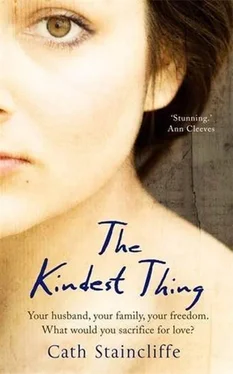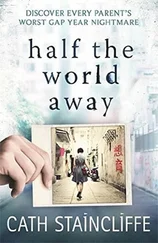Martin cleared his throat. ‘When Mum was ill, I asked her.’
The air between us crackled with tension. I could feel my pulse in my ears and the burn of adrenalin about my neck and wrists.
‘She lied to the police?’ Obviously a family trait.
‘She didn’t tell them about the problems. They didn’t probe too deeply. Suicide back then, there wouldn’t have been any insurance.’ He fell quiet.
I kept my gaze steady. Suicide: illegal, shameful, dirty work at the crossroads. In Dante’s Hell, the suicides are imprisoned in trees, immobilized so they can hurt themselves no more. The Harpies roost in their boughs and rip off twigs making the trees bleed and the souls within moan.
She lied to me. ‘Why didn’t she tell me?’ I demanded.
Martin shrugged awkwardly. ‘You had Adam, you were expecting Sophie, you were travelling fifty miles every few days to visit.’
‘Why didn’t you tell me?’
‘I agreed with her. You’d such a lot on.’
Arguments crowded into my head, batting around like moths to a lamp. ‘Since then?’ I spoke sharply. ‘She’s been dead for fifteen years. Haven’t I a right to know what happened to him? He was my father too.’ There was jealousy clawing in my gut, the loneliness of having been left out. She’d told him but not me. And still the gnawing ache that he had left us, folded his clothes and left us for the dark, cold sea.
A look flew across Martin’s face, guilt, then his features fell. ‘I shouldn’t have said-’
‘Yes, you should – you should have said years ago.’ And I turned my face from him and wept.
Once I had learned from Martin that my father had committed suicide, I found it hard to stay afloat. I’d been punctured, my history, my childhood leaking away. My grief had doubled. I requested a doctor’s appointment; I’d been warned it might take ten days to actually see someone. While I waited to hear, I felt raw: a layer had been peeled back to expose my vulnerability. At night I’d go over and over it, vitriolic with anger at my father, raging at my family’s duplicity. Sleep eluded me – nothing new there – but the acidic fury I felt exacerbated the physical discomforts of sleeplessness. My muscles ached dully, I was dehydrated, my skin and eyes itchy, dizzy, and a headache lapped at the back of my skull.
By day I stuck to the timetable, kept my head down and struggled to cope with the tears that would spring to my eyes at the slightest thing. One afternoon Patsy, a woman I was teaching to read who also lived in my house, came in with a letter from her daughter. Would I read it to her and help her write back? It was mundane stuff, family news and local gossip, nothing overtly sentimental, but as I read on, I broke down. She rushed to comfort me, which made it even worse.
‘Aw, darlin’, what’s wrong? What’s to do?’
‘I lost my husband,’ I spluttered, ‘I miss him so much. And I lost my dad and now I feel as if I’m losing my mind.’
‘We all feel like that sometimes,’ she said. ‘That’s why there’s so many girls cutting up.’
Self-harm is commonplace. Some people cut or burn themselves; others swallow dangerous objects or even find ways of breaking their bones. The prison librarian told me that forty per cent of the women inside have a mental illness, and eighty per cent have a serious drug or drink addiction. Most have been convicted of crimes linked to their addiction. Counselling is practically non-existent – lack of resources. Women speak of waiting nine months, a year or more to see a therapist.
‘You want to see the doctor,’ she told me, ‘get some meds.’
I nodded, wiping my face. ‘I’ve put in for an appointment.’
And then I helped her write the letter.
If I had known that my father had killed himself, if I had experienced the bewilderment, the anger and hurt of that abandonment, would I have even entertained Neil’s request, knowing what it might feel like for his children?
‘Deborah, will you please tell the jury what happened on the fifteenth of June 2009?’
‘The children went out, Sophie first to school, and then Adam.’
I had made a point of asking each of them if they had seen Neil before they left. One of the clues, perhaps, that had made Sophie doubt my story later that day.
‘I sat with Neil in our room until about one o’clock.’
Adam had gone by then. I felt sick. Sick and shaky and terribly frightened. It was the fear of nightmares, visceral and inescapable. Neil seemed calm, resigned to his decision. I wanted to savour our last hours and minutes together. It was a beautiful day, a good day to die. But my mind was fractured, panicky, skittering away from the deed that lay ahead. Would he want to eat? The notion of all these ‘lasts’ – a last meal, last kiss, last breath – was intolerable to me. I said very little. I lay beside him. Should I have made more of it? Brought in flowers and put music on? Songs to end a life to? I did none of these things because until the end I was hoping it would never happen.
‘And then what did you do?’
‘I got us a drink.’
Are you hungry? I had said. Perhaps if he ate a good lunch he would be sick and the whole thing would fall apart, a débâcle that would set him straight. Neil had shaken his head: I’d like a drink. Some wine.
I thought of his Greeks and his bloody Romans, drinking their flagons before falling on their swords. I smiled at him and went downstairs to cry. I’m sure he knew how distressed I was but he didn’t say anything when I returned except ‘Thank you.’ What was he thanking me for? The wine or the rest of it?
‘A drink?’ Mr Latimer wants the details.
‘Some wine.’
Red wine. The colour of blood. Ruby staining his lips, his tongue.
‘And then?’
‘It all happened so quickly,’ I say. Tears start in my eyes, but now I will say my piece. I’m damned if I’ll collapse again. ‘We hadn’t even finished the bottle and Neil said my name, he touched my face. And I knew what he meant.’
‘What was that?’
‘That it was time.’
‘Thank you. Please tell the jury what happened next.’
‘I got the morphine bottles and opened them.’
My hands were shaking and my heart hurt in my chest, a profound pain, as if a fist was squeezing it. I thought how fucking ironic it would be if I had a heart-attack before I could give him the drugs. End up dead and Neil forced to live on.
‘Neil drank one. I kissed him and told him I loved him. He told me the same.’ My voice is uneven, fluting with emotion. In the jury box Alice is crying silently, her hand over her mouth, her eyes closed and her wide face flushed.
‘Then I gave him the other bottle. Then I think he had some more wine. Then the last one from the breathing space kit, or it might have been then that he had the wine. I can’t be sure.’
‘How long did it take Neil to drink all the medicine?’
‘About five minutes.’ It was so quick.
‘And then?’
‘He fell asleep.’ His eyes closed, his hands relaxed, his breathing altered.
‘What time was this?’
‘It was almost two o’clock.’ I remember looking at the alarm clock and thinking that when it next rang Neil would be gone. That I’d be getting up on my own. It seemed unreal. Preposterous.
‘And what did you do then?’
‘I lay down with him. And waited.’
‘How long did you stay like that?’
‘Half an hour. Neil was still breathing. I didn’t know what to do. I knew Sophie would be home soon. I tried to wake him. To see if it was too late.’ As I talk, I can’t catch the rhythm of my own breath. There is no oxygen in it, I am choking. Pushing at Neil, shaking his shoulder, slapping his cheek. Neil, Neil, wake up. Please, oh, God, please.
Читать дальше












